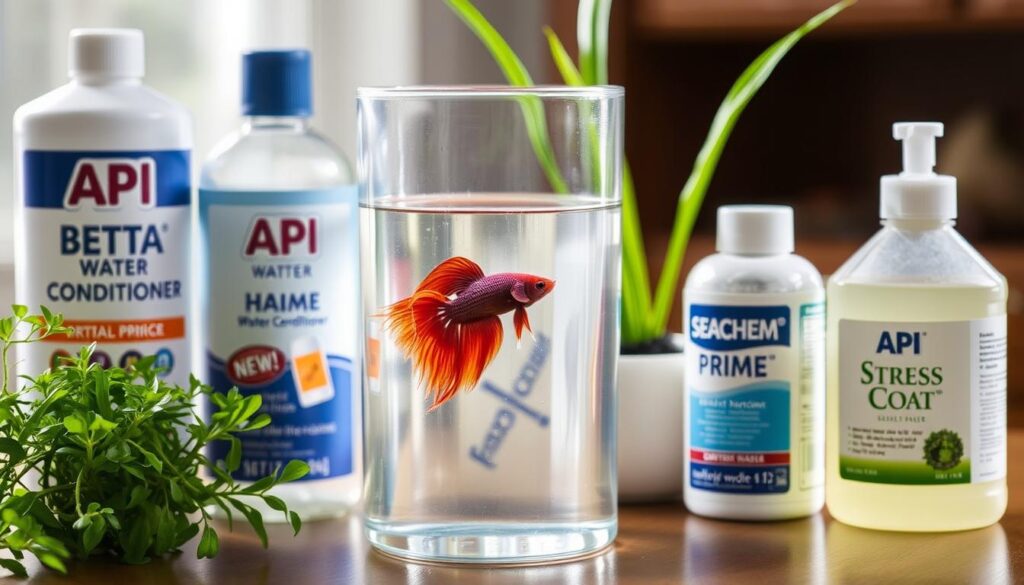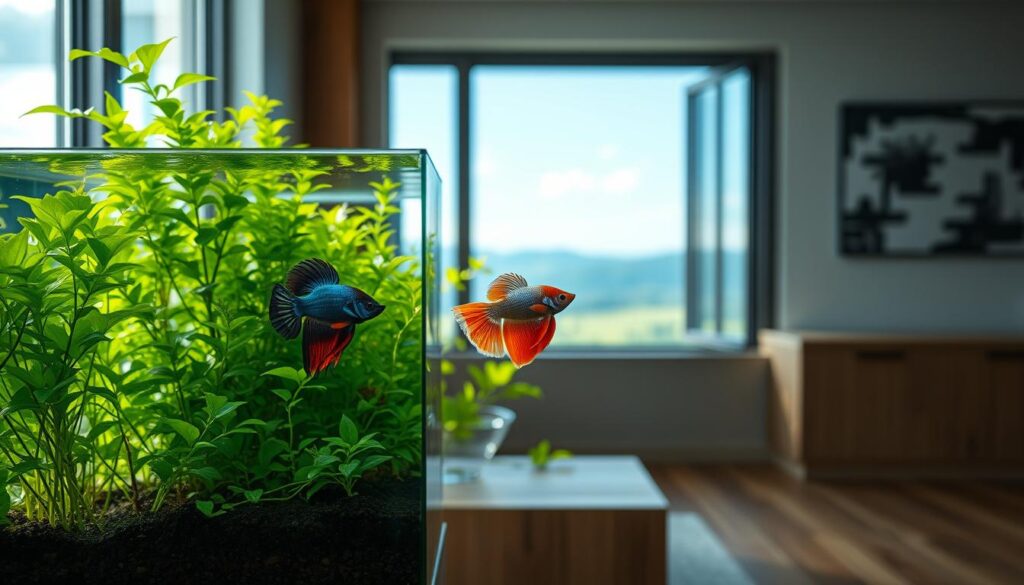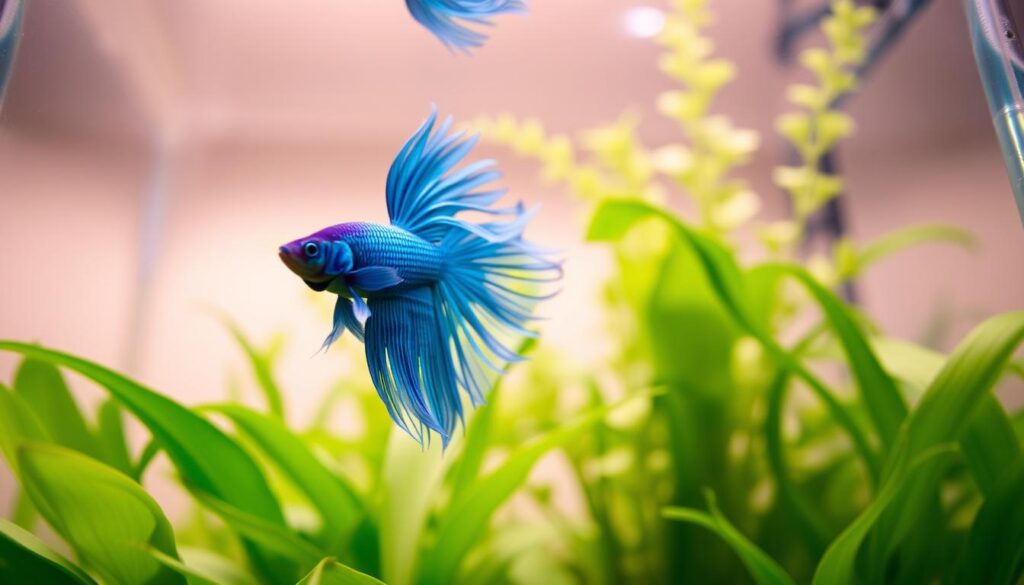Can betta fish survive in tap water? It’s one of the most common questions new aquarium owners ask—and for a good reason. Betta fish are stunning, low-maintenance pets, but the water you use in their tank plays a huge role in their health and happiness.
While tap water is easily available in most homes, it often contains chlorine, chloramine, and other chemicals that can be harmful to your betta if not properly treated.
In this guide, we’ll explore whether bettas can safely live in tap water, what risks are involved, and how you can make tap water safe for your betta’s long, healthy life.
Key Takeaways
- Tap water needs treatment before it’s safe for betta fish.
- Chlorine and other chemicals can harm betta fish.
- Proper water treatment is crucial for betta fish health.
- Regular water changes are necessary.
- Using a water conditioner can help.
The Truth About Betta Fish and Tap Water
Many betta owners wonder if tap water is safe for their fish. The answer is not simple. Tap water can be good or bad for betta fish, depending on its quality and treatment.
Common Misconceptions About Betta Water Requirements
Betta fish have specific water needs. Let’s clear up some common myths!
The “Bettas Can Live in Puddles” Myth
Betta fish come from shallow waters in Thailand. But, they don’t do well in tiny puddles or untreated tap water. In the wild, they live in slow-moving water with stable conditions.
Why Bowl Setups Often Fail
Many betta owners use small bowls without proper filtration or regular water changes. This can cause toxins to build up, stressing the fish and shortening its life. Regular water changes and a suitable tank size are crucial for betta health.
Why Water Quality Matters for Betta Health
Water quality is key for your betta fish’s health. Poor water can cause serious problems, from stunted growth to early death.
How Poor Water Affects Betta Lifespan
Tap water has chlorine and chloramines that can harm betta fish. If not treated, these chemicals can damage their gills and skin, leading to infections and a weakened immune system. Using a water conditioner can help remove these harmful substances.
The Connection Between Water and Immune System
A betta fish’s immune system is tied to its environment. Poor water quality stresses the fish, making it more likely to get sick. Maintaining good water quality is essential for keeping your betta’s immune system strong.
Read Also Shocking Truth: How Big Can Betta Fish Get in a Tiny Bowl?
Can Betta Fish Survive in Tap Water?
Many betta owners wonder if these beautiful fish can live in tap water. The answer is not simple. It depends on how you treat the tap water before adding it to their tank.
The Short Answer: Yes, But With Proper Treatment
Yes, betta fish can live in tap water if it’s treated right. Tap water has chemicals and contaminants that can harm or kill betta fish. So, how do you make tap water safe for your betta?
- Use a water conditioner to remove chlorine and chloramines.
- Check for heavy metals and other contaminants.
- Adjust the pH and temperature as needed.
Understanding Tap Water Composition
Tap water is more than just water. It’s a mix of different substances. Here are some key components to know:
Chlorine and Chloramines
These chemicals kill bacteria in tap water but are toxic to betta fish. Chlorine evaporates fast, but chloramines last longer and need a conditioner to remove.
Heavy Metals and Other Contaminants
Tap water may have heavy metals like lead, copper, and zinc. These can harm your betta’s health. Other contaminants include pesticides, industrial chemicals, and medicines.
Potential Dangers in Untreated Tap Water
Untreated tap water can be dangerous for your betta. Chlorine and chloramines can hurt their gills and cause breathing problems. Heavy metals can cause long-term health issues, like organ damage and weak immune systems.
To keep your betta safe, treat the tap water before adding it to their tank. By understanding what’s in your tap water and removing harmful substances, you can create a healthy home for your betta.
Essential Water Parameters for Betta Fish Health
To keep your betta fish thriving, it’s key to understand the water parameters they need. Betta fish have specific water conditions for their health. Getting these right is simpler than you might think. Let’s explore the main factors for your betta’s happiness and health.
Ideal pH Levels for Bettas
Betta fish do best in slightly acidic to neutral water. The ideal pH range is 6.5 to 7.5. Aim for a pH of about 7, as it’s closest to their natural habitat. Avoid sudden pH changes, as they can stress your betta. Use a pH test kit to check the water’s acidity and adjust it as needed to keep your betta healthy.
Temperature Requirements
Betta fish love warmer waters, between 76°F and 82°F (24°C to 28°C). The best temperature is around 78°F to 80°F (25°C to 27°C). Don’t place their tank near drafts or direct sunlight, as this can cause temperature swings. Use a reliable aquarium heater to keep the temperature stable, ensuring your betta stays comfortable and healthy.
Hardness and Alkalinity Considerations
Betta fish prefer soft, slightly acidic water. Water hardness should be between 0 and 10 dGH, and alkalinity should be around 30 to 120 ppm. While betta fish can adjust to different water hardness levels, sudden changes can be stressful. Keep an eye on your water’s hardness and alkalinity. Make gradual adjustments if needed to provide the best water for your betta fish.
5 Must-Have Products for Treating Tap Water
Keeping your betta healthy means treating tap water right. Tap water often has harmful chemicals like chlorine and chloramines. You’ll need a few key products to make it safe.
Water Conditioners and Dechlorinators
Water conditioners and dechlorinators are key for removing chlorine and chloramines. Top brands like API and Tetra have effective solutions.
Top Brands and Their Benefits
API Tap Water Conditioner removes chlorine, chloramines, and heavy metals. It’s a complete solution. Tetra AquaSafe also removes chlorine and chloramines and detoxifies heavy metals.
Dosage Guidelines
Always follow the manufacturer’s dosage instructions. Usually, you’ll need 1-2 teaspoons of conditioner per 10 gallons of water.
Water Testing Kits
Testing your water regularly is crucial for your betta’s health. Water testing kits check pH, ammonia, and nitrite levels. Brands like API and Seachem are reliable.
pH Adjusters
pH adjusters help keep your betta’s water pH in the right range (6.5-7.5). pH Up and pH Down products are used for this.
Beneficial Bacteria Supplements
Beneficial bacteria supplements help keep your tank healthy. They convert ammonia into nitrite and then nitrate, preventing spikes.
| Product | Purpose | Brand Example |
|---|---|---|
| Water Conditioner | Remove chlorine and chloramines | API Tap Water Conditioner |
| Water Testing Kit | Monitor water parameters | API Freshwater Master Test Kit |
| pH Adjuster | Adjust pH levels | Seachem pH Up/Down |
| Beneficial Bacteria Supplement | Establish healthy biological balance | API Quick Start |
Using these 5 products can make a safe and healthy home for your betta. Treating tap water is an ongoing task that needs regular checks and adjustments.

Step-by-Step Guide to Preparing Tap Water for Bettas
Preparing tap water for your betta fish is key to a healthy environment. We’ll show you how to do it right! Tap water is easy to use, but it needs some care before it’s safe for your betta.
Testing Your Tap Water Quality
First, find out what your tap water is like. Use a water testing kit to check pH, ammonia, nitrite, and nitrate levels. This will tell you what changes you need to make.
- Check pH levels to ensure they’re within the ideal range for betta fish (6.5-7.5).
- Test for ammonia and nitrite – their presence indicates water that’s not yet safe for your betta.
- Nitrate levels should be as low as possible; high nitrates can be harmful to your betta.
Treating Water with Conditioner
After testing, it’s time to treat your water. Water conditioners remove chlorine and chloramines, which are bad for betta fish.
When picking a water conditioner, look for products that:
- Remove chlorine and chloramines.
- Neutralize heavy metals.
- Are safe for use with betta fish.
Adjusting pH and Hardness If Necessary
If your water test shows pH or hardness issues, you’ll need to adjust it. Betta fish like slightly acidic to neutral water. If your tap water is too alkaline, you’ll need to adjust it.
To adjust pH and hardness:
- Use pH adjusters to bring the pH within the ideal range.
- Consider using a water buffer to stabilize the pH and prevent sudden changes.
- If your water is too hard, you can mix it with distilled or reverse osmosis water to achieve the right balance.
Aging Water: Is It Necessary?
Aging water used to be thought to let chlorine evaporate. But with modern water conditioners, it’s not needed. Still, if you’re using a new conditioner or want extra safety, letting the water sit for 24 hours can help.
The main thing for healthy tap water is proper treatment and regular water changes. By following these steps, you’ll create a great home for your betta fish.
Setting Up Your Betta’s Tank with Treated Tap Water
Setting up a betta tank with treated tap water is key to a happy pet! You’ve already treated your tap water. Now, let’s explore the world of freshwater fish tank setups.
Tank Size and Equipment Recommendations
For betta fish care tips, the right tank size and equipment matter a lot. Here’s what you need to know:
-
Minimum Tank Size Requirements
A 5-gallon tank is the minimum, but bigger is better if you can! A larger tank means a more stable home for your betta.
-
Filtration Options
Choose a gentle filter to avoid stressing your betta. Options include sponge filters or low-flow hang-on-back filters.
-
Heating Solutions
Bettas like warm water, so a heater is essential. Keep the water between 76-82°F (24-28°C) for comfort.
Cycling Your Tank Before Adding Your Betta
Before your betta moves in, cycle the tank. This lets beneficial bacteria grow, creating a healthy space. Cycling takes 2-4 weeks, so be patient!
Acclimating Your Betta to New Water
When you introduce your betta, acclimate it slowly to the new water. Start by floating the unopened bag in the tank for 15-20 minutes. Then, add tank water to the bag before releasing your betta.

Water Change Best Practices for Betta Tanks
Betta fish love clean water. Let’s explore the best ways to keep their tanks clean. Regular water changes are key to a healthy betta tank. The right frequency and method depend on tank size, water quality, and your betta’s health.
How Often to Change Water
How often should you change your betta tank’s water? It’s best to change 25-50% every week. But, this can change based on your tank’s conditions. If your water gets cloudy or your betta looks stressed, it’s time for a change!
Partial vs. Complete Water Changes
There are two main water change options: partial or complete. Partial water changes are safer for your betta. They help keep the good bacteria in your tank. Complete changes are stressful and should only be done in emergencies, like a tank cleaning or disease outbreak.
Step-by-Step Water Change Process
Changing the water is easy. Here’s how to do it:
Preparing the New Water
Start by preparing the new water. Use a water conditioner to remove chlorine and chloramines. Make sure the new water is the same temperature as the tank water to avoid shocking your betta.
Removing and Adding Water Safely
Use a gravel vacuum to clean the substrate. Then, remove the water you need. When adding new water, do it slowly to avoid disturbing your betta or causing a strong current.
By following these steps, you’ll create a healthy home for your betta fish. Remember, regular water changes are crucial for their happiness and health!
7 Warning Signs Your Tap Water Is Harming Your Betta
Tap water can be a hidden danger for your betta. Here are the 7 warning signs to watch out for. As betta owners, we want to ensure our pets live in a healthy environment. This starts with understanding the risks associated with tap water.
Physical Symptoms of Poor Water Quality
Poor water quality can show in various physical symptoms in your betta. Keep an eye out for these signs:
Fin Rot and Deterioration
If your betta’s fins are frayed, torn, or rotting, it’s a sign of poor water quality. Fin rot is a common issue in betta fish exposed to poor water conditions.
Color Changes and Lethargy
A healthy betta is vibrant and active. If your betta’s colors dull or they become lethargic, check your water quality. These changes can be subtle, so monitor your betta closely.
Respiratory Issues
Labored breathing or gasping at the surface can indicate water struggles. This is a serious sign that requires immediate attention.

Behavioral Changes to Watch For
Betta fish can also exhibit behavioral changes when exposed to poor water quality. Look out for unusual behaviors such as hiding, loss of appetite, or erratic swimming patterns. These changes can be your betta’s way of telling you that something is wrong.
Emergency Steps If You Suspect Water Problems
If you notice any of these warning signs, act quickly. Start by testing your water parameters and making necessary adjustments. Perform a partial water change to improve conditions, and consider using a water conditioner to remove harmful chemicals. By taking these steps, you can help your betta recover and prevent future issues.
Alternative Water Sources: When Tap Water Won’t Work
If tap water isn’t working for your betta, don’t worry. There are other water sources you can try. Bottled water, reverse osmosis water, and even rainwater can be good choices under the right conditions.
Bottled Water Options
Bottled water can be a good alternative. But, make sure to pick the right type. Look for “spring water” or “purified water” without many additives. Always check the label for minerals or additives that might harm your betta.
Reverse Osmosis and Distilled Water
Reverse osmosis (RO) and distilled water are also options. But, they need adjustments before they’re safe for your betta. They are very pure, lacking the minerals betta fish need. You’ll need to add minerals back in with special products from pet stores.
Rainwater Collection Considerations
Collecting rainwater is a cost-effective and natural choice. But, it’s important to make sure the collection system is clean. Rainwater can have pollutants from the air and roof surfaces. It may need treatment before it’s safe for your fish.
Conclusion: Creating a Thriving Environment for Your Betta
We’ve covered a lot about keeping your betta fish healthy in tap water. Now, it’s time to put it all together! Creating a great home for your betta is more than just a tank. It’s about setting up the right conditions for them to thrive.
By following our betta fish care tips, you’ll be on your way to a fantastic tank setup. This will keep your betta happy and healthy.
Success comes from proper tank setup, regular water changes, and love. Get creative with your tank by adding plants, decorations, or even tankmates. With the right care, your betta will do great, and you’ll have a rewarding pet experience.
So, what are you waiting for? Start your betta fish care journey and create an amazing aquarium. Your friends will be jealous! Happy fish-keeping!

